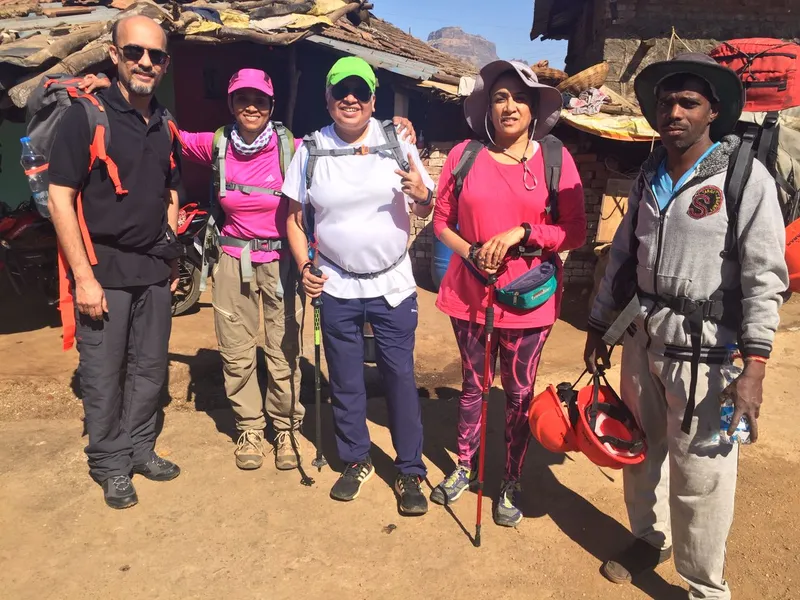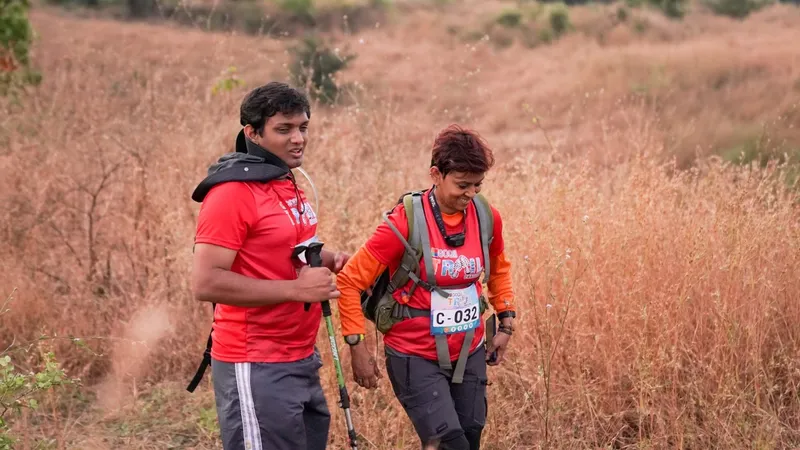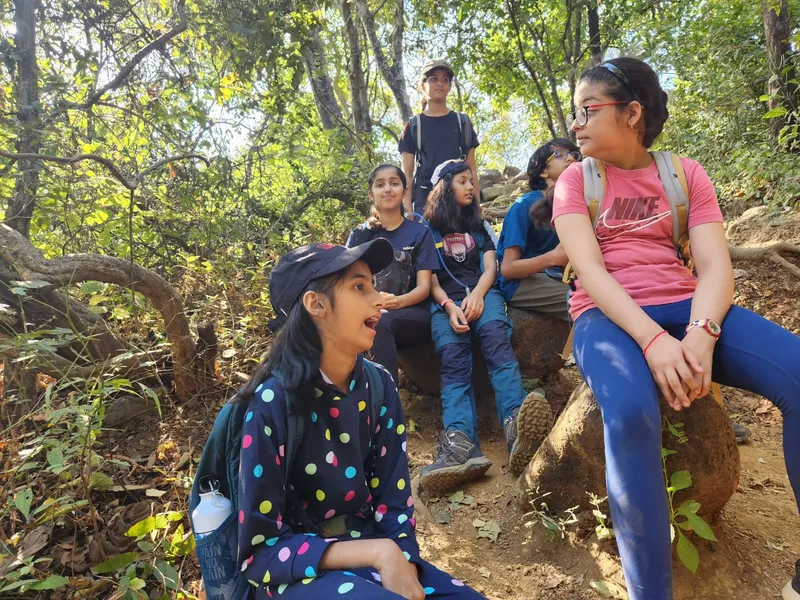These women mountaineers are making trekking inclusive for all
Bohemian Adventures, an adventure outfit founded in 2014, is run by three women—Anusha Subramanian, Sashi Bahuguna, and Guneet Puri.
Key Takeaways
- For beginners, Bohemian Adventurers first provides less challenging trek options before the difficult ones.
- Its six-day-long Himalayan beginner treks start from Rs 40,000 upwards.
- The trio have facilitated over 500 treks in Uttrakhand, Ladakh, Everest Base Camp in Nepal, and Mount Kilimanjaro in Tanzania, among others.
After an exhilarating and arduous week-long trek in the Himalayas, Anusha Subramanian and Guneet Puri were chatting on Facebook from their respective homes, miles apart and reliving their unforgettable experience.
The picture of the broken rocky paths flooded with unwanted grass, a sky full of hues, and the setting sun casting a warm glow over the rugged terrain and snow-capped mountains, was etched in their hearts.
The duo’s affinity with the mountains and trekking led to the thought of turning their passion into a business, which led them to establish The Bohemian Adventures, an adventure outfit with the prime purpose of doing inclusive treks, in December 2014.
The startup is run by Anusha Subramanian—an independent journalist and British Chevening Scholar based in Mumbai, Doon native and ex-banker Sashi Bahuguna, and Rudrapur resident Guneet Puri—a former editor.
“We want trekking to be an inclusive experience for all-senior citizens, women, and people with disability. Nothing should stop anyone from discovering new horizons,” Subramanian tells HerStory.
The first steps

Anusha Subramanian with fellow trekkers
As a seven-year-old, Subramanian went on her first trek to Matheran, a hill station near Mumbai.
“I was very happy outdoors. It was an exhilarating experience, and since then, there has been no looking back for me,” she says.
Despite her full-time job, she managed to take out time for trekking. In 2008, a 35-year-old Subramanian pursued a professional degree in adventure sports from Nehru Institute of Mountaineering, Uttarkashi, where she met her co-founder and friend Puri.
After 25 years in journalism, Subramanian quit her job at the end of 2012 because of a lack of growth opportunities.
In 2013, when Uttarakhand floods ravaged myriad lives, Subramanian and Puri were part of a rescue operation, where they had the opportunity to work with India’s first woman Mount Everest summiteer Bachendri Pal.
During a trek organised for the lost souls and destruction in Uttrakhand, the duo met their third co-founder Sashi Bahuguna.
The trio instantly hit off, and their shared love for the outdoors led them to start Bohemian Adventures. In fact, they wanted to expand the trekking experience to people from all walks of life.
Subramanian recollects talking to a visually impaired person while working on a freelance journalism project.
He told her about his love for paragliding and trekking, which left Subramanian with the idea of making treks inclusive for people with disability.
As such, she led a group of three visually impaired individuals and ten non-disabled people to the summit of Mount Kilimanjaro in 2018. Before this, she participated in India’s first tandem cycling expedition from Manali to Khardungla in 2017.
Starting with the visually impaired, Subramanian later conducted treks for kids and adults with Autism, ADHD and, more recently, a person with Parkinson’s, with whom she is leading another trek to Everest Base Camp this April.
Keeping the passion alive

Anusha Subramanian accompanying a visually impaired person on a trek
Subramanian, an asthmatic herself, faced the challenge of not having adequate support from guides to manage her condition while trekking. The trio decided to address this issue and not let their clients go through the same. They chose to operate low on volume in high-altitude treks, having at most ten members to ensure close coordination and communication.
When a client expresses interest in a particular trek, the team interviews them to understand their fitness level, previous climbing experience, and health conditions.
Based on this information, they assess whether the trek is suitable for them or not. If deemed fit, they give the clients the green signal. However, if the team feels that the trek might be too challenging, they suggest alternative treks that may be better suited to their capabilities. The team also customises the diet plans according to the client’s health conditions.
For beginners, Bohemian Adventurers first provides less challenging trek options before the difficult ones.
“Our ultimate goal is to ensure each client has a safe and enjoyable trekking experience. Hence, we check on people’s health and how they react to different conditions right from the beginning,” Subramanian adds.
The trek’s price varies according to the number of days and distance covered. The six-day-long Himalayan beginner treks start from Rs 40,000 upwards.
Bohemian Adventures breaks the stereotype of trekking being a man’s job, as nearly 50% of its clients are women. “Many women in their 40s and 50s, who have dedicated their lives to their myriad of responsibilities, now want to challenge their adventurous spirits,” Subramanian says.

All girls trek in Sahyadri
The trio have facilitated over 500 treks to Valley of Flowers, Hemkund Sahib, Mount Rudugaira, Dayara Bugyal, Mount Thelu in Uttrakhand, Stok Kangri in Ladakh, Everest Base Camp in Nepal, Sandhan Valley in Maharashtra, and Mount Kilimanjaro in Tanzania, among others.
For the trio, leading an all-women adventure firm is a Herculean task. Subramanian recalls people taking them as mere hobbyists and not professionals. As a male-dominated field, it was challenging for them to establish trust among people.
“Initially, people doubted us. But when they saw our work and potential, they were relieved of all doubts,” she says.
In 2020, the bootstrapped startup was hit by the COVID-19 pandemic. However, the team did not lose hope and sustained.
“We utilised those two years to build our social media presence, made new itineraries, and researched for new trek places,” Subramanian says.
After fighting these roadblocks, one at a time, Subramanian looks forward to having more women mountain guides in the profession. For this, the trio is looking to sponsor women interested in pursuing mountaineering courses to become adventure guides.
“Mountains don’t discriminate, then why should we,” Subramanian says.
(This story was updated to correct a spelling error.)
Edited by Suman Singh







![[YS Exclusive] EV maker Simple Energy lays roadmap for rapid store expansion, deliveries](https://images.yourstory.com/cs/2/c2cedff02d6111ef9021856619e24ca1/IMG0382-1737598981944.jpeg?mode=crop&crop=faces&ar=1%3A1&format=auto&w=1920&q=75)